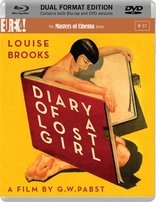Diary of a Lost Girl Blu-ray Movie
HomeDiary of a Lost Girl Blu-ray Movie 
Tagebuch einer Verlorenen / Masters of Cinema / Blu-ray + DVDEureka Entertainment | 1929 | 116 min | Rated BBFC: PG | Nov 24, 2014
Movie rating
7.5 | / 10 |
Blu-ray rating
| Users | 0.0 | |
| Reviewer | 4.0 | |
| Overall | 4.0 |
Overview
Diary of a Lost Girl (1929)
Together with Pandora's Box (1928), Diary confirmed Pabst's artistry as one of the great directors of the silent period and established Brooks as an "actress of brilliance, a luminescent personality and a beauty unparalleled in screen history" (Kevin Brownlow, The Parade's Gone By). Brooks, in a delicately restrained performance, plays the naïve daughter of a prosperous pharmacist.
Starring: Louise Brooks, Fritz Rasp, Franziska Kinz, André Roanne, Josef RovenskýDirector: Georg Wilhelm Pabst
| Foreign | 100% |
| Drama | 61% |
Specifications
Video
Video codec: MPEG-4 AVC
Video resolution: 1080p
Aspect ratio: 1.33:1
Original aspect ratio: 1.33:1
Audio
Music: LPCM 2.0
Subtitles
English
Discs
50GB Blu-ray Disc
Two-disc set (1 BD, 1 DVD)
DVD copy
Playback
Region B (locked)
Review
Rating summary
| Movie | 4.5 | |
| Video | 4.0 | |
| Audio | 5.0 | |
| Extras | 1.5 | |
| Overall | 4.0 |
Diary of a Lost Girl Blu-ray Movie Review
Reviewed by Dr. Svet Atanasov December 4, 2014Georg Wilhelm Pabst's "Tagebuch einer Verlorenen" a.k.a. "Diary of a Lost Girl" (1929) arrives on Blu-ray courtesy of British distributors Eureka Entertainment. The only supplemental feature on the disc is a new video essay created by filmmaker and critic David Cairns. The release also arrives with a 40-page illustrated booklet featuring writings by Louise Brooks, Lotte Eisner, Louelle Interim, Craig Keller, and R. Dixon Smith. With German intertitles and optional English subtitles. Region-B "locked".
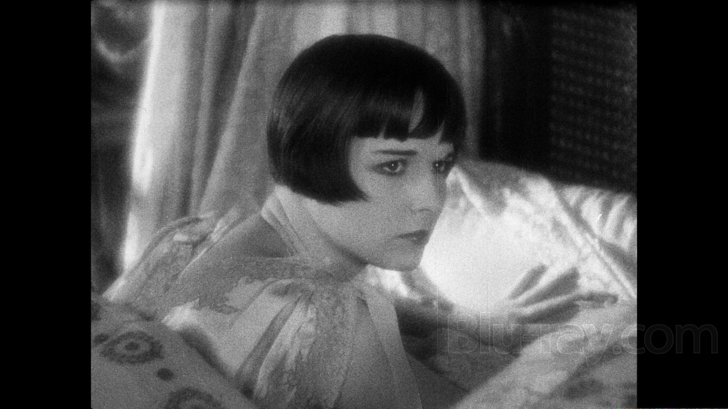
The lost girl
The young and naïve Thymian (the beautiful Louise Brooks, Pandora's Box) is seduced by an older man (Fritz Rasp, Metropolis [Reconstructed & Restored]) who has been hired to assist her father (Josef Rovenský, Manja Valewska) in his pharmacy. When Thymian gives birth to his child, she is asked to marry him so that her family’s reputation would remain unblemished. But Thymian openly rejects the older man.
The rebellious act angers Thymian’s relatives and she is promptly sent to a strict reform school.
Meanwhile, Thymian’s father begins a relationship with the ambitious maid Meta (Franziska Kinz, An Enemy of the People), who quickly tricks the old man to believe that they were meant to spend the rest of their lives together. Eventually, he marries her and she becomes the new master of his house.
In the reform school Thymian is visited by Count Nicolas Osdorff (André Roanne, The Five Cents of Lavarede), a relative who has also been rejected by his wealthy father (Arnold Korff, The Haunted Castle). Count Nicolas convinces Thymian that she would never be accepted back in her family and that she must begin a new life alone. Shortly after, assisted by her good friend Erika (Edith Meinhard), Thymian runs away. The beautiful girl then ends up in a popular brothel, where she learns that in the real world everything and everyone has a price. Years later, at a large party she meets her father, his wife and his assistant.
It isn’t difficult to see why Georg Wilhelm Pabst was forced by the censors to edit Diary of a Lost Girl -- its observations and concerns feel strikingly modern. For example, when the beautiful Thymian is raped by the older man and becomes pregnant, her family decides to cover up the crime with a marriage that will protect its public image. There is a deeply disturbing logic behind the decision – which is that as long as the rapist and his victim are officially declared a couple, the society they are a part of does not see anything wrong with the hideous act that has brought them together.
The dubious moral standards of the time are targeted again after Thymian enters the brothel. As strange as it may sound, this is the only place where ‘respectable’ men honestly declare their intentions and the women have the power to choose. It is s a microcosm of the world that will eventually replace the one Thymian and the rest of the girls live in – here there are no masks (unless a customer requests them), there are no class restrictions, and money can most certainly buy happiness.
The film ends with a hugely pretentious sequence in which Thymian utters the right words and then exits the reform school she has been invited to visit with a group of respectable ladies, but it was not the finale Pabst had in mind.
Brooks looks strikingly elegant. Her sudden transformation in the brothel before she meets her first client is the film’s highlight. (The dresses and hats are superb. Also, pay attention to the stylish shoes the women wear).
Eureka Entertainment’s release presents Diary of Lost Girl with an excellent piano score performed by Javier Perez de Azpeitia. It includes fragments from classical pieces by Scriabin, Schumann, Chopin, and Ghlinka, amongst others.
Diary of a Lost Girl was recently reconstructed and restored in 2K by Fondazione Cineteca di Bologna, the Deutsche Filminstitut -- DIF, Frankfurt am Main, and the Friedrich-Wilhelm-Murnau-Stiftung, Wiesbaden. The scanning and digital mastering of Diary of a Lost Girl was carried out at Omnimago, Gmbh, Ingelheim, Germany.
Diary of a Lost Girl Blu-ray Movie, Video Quality 
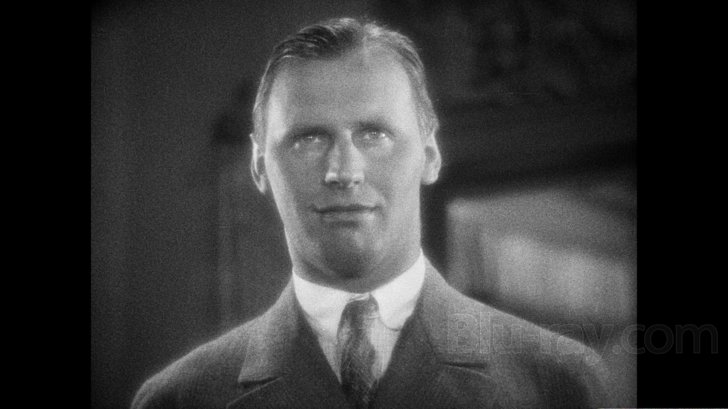
Presented in an aspect ratio of 1.33:1, encoded with MPEG-4 AVC and granted a 1080p transfer, Georg Wilhelm Pabst's Diary of a Lost Girl arrives on Blu-ray courtesy of British distributors Eureka Entertainment.
The following text precedes the film's opening credits:
"Due to censorship, Tagebuch einer Verlorenen (Diary of a Lost Girl) was shortened and changed drastically. In 1997, a reconstruction and photochemical restoration of the film as it had originally been intended was created by the Fondazione Cineteca di Bologna, the Deutsche Filminstitut -- DIF, Frankfurt am Main, and the Friedrich-Wilhelm-Murnau-Stiftung, Wiesbaden. It is based on the dupe negative from the Danish Film Institute, Copenhagen. Most of the missing scenes were added from a contemporary copy from the Archivo Nacional de la Imagen -- Sodre, Montevideo. The reconstruction of the edit that was shown at the film's premiere is based on a comparison of the surviving copies, as well as the censor records of the Filmoberprufstelle Berlin. The wording of the German intertitles was recreated with the aid of German-French intertitles from a copy at the Cinematheque Royale de Belgique, Brussels. A few surviving titles from the copy at the Archivo Nacional de la Imagen -- Sodre, Montevideo serve as a model for the typography. The master negative of this edit was used for the 2K digital version. For this HD mastering, the image has been corrected in places, and heavy damage to the film has been retouched."
Because different sources were used during the reconstruction process, some fluctuations in terms of clarity, detail and general image stability remain. Minor scratches, specks, and some traces of fading are also visible. This being said, the film's overall appearance is enormously pleasing. To be perfectly clear, while there is certainly room for various cosmetic improvements (such as manual cleanup in select areas) and minor stabilization enhancements, the film really does look surprisingly fresh and vibrant. Depth, in particular, is consistently pleasing. Of course, it is not too difficult to tell where different elements were used during the film's reconstruction, but different optimizations have ensured that the film does have a fluid organic appearance which is also as consistent as the surviving elements allow. Generally speaking, detail is very good, with many of the close-ups, in particular, looking quite wonderful (see screencaptures #1, 9, and 18). Contrast stability is also good. The only exceptions occur in areas where the above mentioned source limitations are a factor (compare screencaptures #1 and 11). There are no traces of problematic degraining adjustments. If there are some noticeable grain fluctuations they can be traced back to inherited density fluctuations. Also, there are no problematic sharpening adjustments. The encoding is excellent. All in all, considering the fact that different sources were used to restore and reconstruct Diary of a Lost Girl, the end result is indeed enormously pleasing. (Note: This is a Region-B "locked" Blu-ray release. Therefore, you must have a native Region-B or Region-Free PS3 or SA in order to access its content).
Diary of a Lost Girl Blu-ray Movie, Audio Quality 
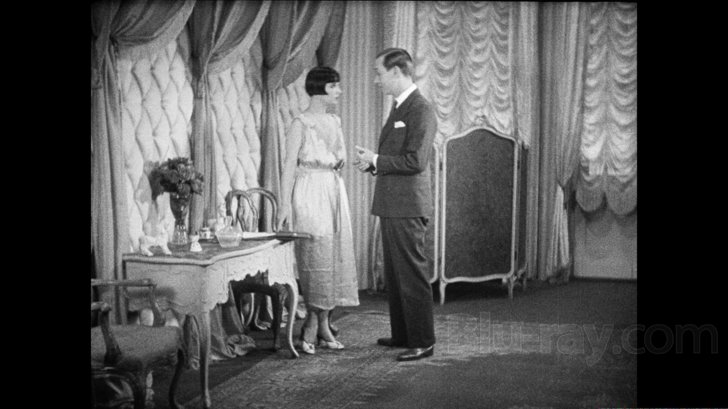
There is only one standard audio track on this Blu-ray release: Music LPCM 2.0. For the record, Eureka Entertainment have provided optional English subtitles for the German intertitles.
The beautiful piano score is performed by Javier Perez de Azpeitia. It includes fragments from classical pieces by Scriabin, Schumann, Chopin, and Ghlinka, amongst others. Clarity and depth are excellent. There is an excellent range of nuanced dynamics as well, which effectively enhance a number of the more dramatic sequences. (See the final sequence at the reform school where Thymian meets her old friend again). There are no audio dropouts or distortions to report in this review.
Diary of a Lost Girl Blu-ray Movie, Special Features and Extras 
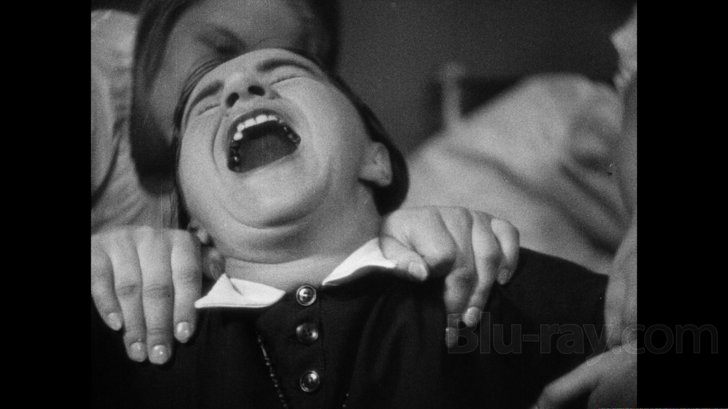
- Naked on My Goat - this video essay was created by filmmaker and critic David Cairns. It focuses on Louise Brooks' rather unusual career and personal life, her success in Germany (with some very interesting notes about the two men she fell in love with), Georg Wilhelm Pabst's wotk and the production history of Diary of a Lost Girl. The essay is narrated by Fiona Watson. In English, not subtitled. (12 min).
- Booklet - 40-page illustrated booklet featuring writing by Louise Brooks, Lotte Eisner, Louelle Interim, Craig Keller, and R. Dixon Smith.
Diary of a Lost Girl Blu-ray Movie, Overall Score and Recommendation 
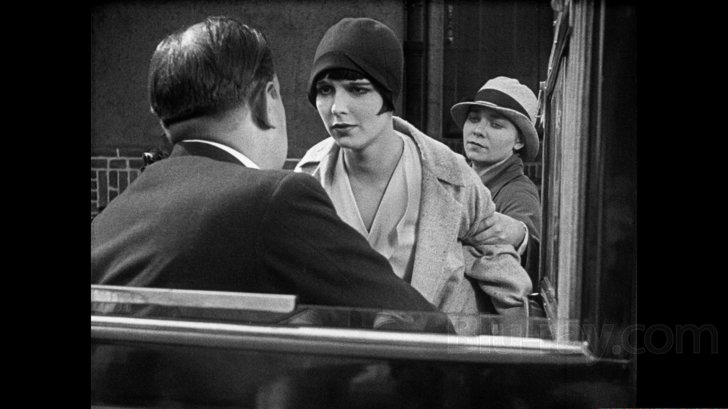
What a wonderful release. British distributors Eureka Entertainment have added some outstanding silent films to their Blu-ray catalog this year and Georg Wilhelm Pabst's Diary of a Lost Girl is unquestionably one of the best. I sincerely hope that in 2015 we will also see Pandora's Box on Blu-ray. HIGHLY RECOMMENDED.
Similar titles
Similar titles you might also like

A Separation
Jodái-e Náder az Simin / جدایی نادر از سیمین
2011

City of Life and Death
南京!南京! / Nanjing! Nanjing!
2009

Neon Bull
Boi Neon
2015

Accattone / Love Meetings
Masters of Cinema
1961

Drive My Car
ドライブ・マイ・カー / Doraibu mai kâ
2021

Sansho the Bailiff
山椒大夫 / Sanshô dayû
1954

Umberto D.
1952

Vivre Sa Vie
My Life to Live
1962

The Painted Bird
Nabarvené ptáce / Montage Pictures
2019

Les Dames du Bois de Boulogne
1945

The Swindle
Rien Ne Va Plus
1997

The Great Beauty
La grande bellezza
2013

The Taste of Tea
茶の味 / Cha no aji
2004

Another Round
Druk
2020

The Conformist
Il Conformista / Arrow Academy
1970

Burning
버닝 / Beoning
2018

Shadow
影 / Yǐng
2018

The Dance of Reality
La danza de la realidad
2013

Phantom
Masters of Cinema
1922

The Salesman
Forushande
2016
